New Beacon Bible Commentary | NBBC (29 vols.)
Digital Logos Edition

Overview
The New Beacon Bible Commentary is an engaging, indispensable reference tool that equips you to study and meditate on God’s Word. Written from the Wesleyan theological perspective, it offers insightful scholarship to help you unlock Scripture’s deeper truths and garner an awareness of the history, culture, and context attributed to each book studied. Readable, relevant, and academically thorough, it offers a new standard for understanding and interpreting the Bible in the twenty-first century.
This title is included in the following collections
You can save when you purchase this product as part of a collection.
New Beacon Bible Commentary | ...
$1,134.53$1,134.53

Key Features
- The latest scholarship from notable experts in the Wesleyan tradition
- Convenient introductory material for each book of the Bible, including information on authorship, dating, history, audience, sociological/cultural issues, purpose, literary features, theological themes, hermeneutical issues, and more
- Comprehensive annotation divided into three sections:
- Background elements behind the text
- Verse-by-verse details and meanings
- Significance, relevance, intertextuality, and application
Product Details
- Title: New Beacon Bible Commentary Upgrade (NBBC)
- Series: New Beacon Bible Commentary (NBBC)
- Publisher: Beacon Hill
- Volumes: 29
- Pages: 8,947
- Christian Group: Methodist and Wesleyan
- Resource Type: Commentaries
- Topic: Biblical Studies
Individual Titles
- Genesis 1–11: A Commentary in the Wesleyan Tradition by Joseph Coleson
- Leviticus: A Commentary in the Wesleyan Tradition by Thomas J. King
- Deuteronomy: A Commentary in the Wesleyan Tradition by Stephen Green
- Joshua: A Commentary in the Wesleyan Tradition by Stephen Lennox
- Judges: A Commentary in the Wesleyan Tradition by Robert D. Branson
- 1 & 2 Samuel: A Commentary in the Wesleyan Tradition by Kevin J. Mellish
- 1 & 2 Chronicles: A Commentary in the Wesleyan Tradition by Mitchel Modine
- Psalms 1–72: A Commentary in the Wesleyan Tradition by David Thompson
- Proverbs: A Commentary in the Wesleyan Tradition by John E. Hartley
- Ecclesiastes and Lamentations: A Commentary in the Wesleyan Tradition by Stephen J. Bennett
- Jeremiah 1–25: A Commentary in the Wesleyan Tradition by Alex Varughese
- Jeremiah 26–52: A Commentary in the Wesleyan Tradition by Alex Varughese and Mitchel Modine
- Ezekiel: A Commentary in the Wesleyan Tradition by Brad E. Kelle
- Daniel: A Commentary in the Wesleyan Tradition by Jim Edlin
- Hosea–Micah: A Commentary in the Wesleyan Tradition by Timothy M. Green
- Mark: A Commentary in the Wesleyan Tradition by Kent Brower
- Luke 1–9: A Commentary in the Wesleyan Tradition by David A. Neale
- Luke 9–24: A Commentary in the Wesleyan Tradition by David A. Neale
- Acts: A Commentary in the Wesleyan Tradition by Richard P. Thompson
- Romans 1–8: A Commentary in the Wesleyan Tradition by George Lyons and William Greathouse
- Romans 9–16: A Commentary in the Wesleyan Tradition by George Lyons and William Greathouse
- 2 Corinthians: A Commentary in the Wesleyan Tradition by Frank G. Carver
- Galatians: A Commentary in the Wesleyan Tradition by George Lyons
- Philippians: A Commentary in the Wesleyan Tradition by Dean Flemming
- Hebrews: A Commentary in the Wesleyan Tradition by Kevin L. Anderson
- James: A Commentary in the Wesleyan Tradition by C. Jeanne Orjala Serrão
- 1 & 2 Peter and Jude: A Commentary in the Wesleyan Tradition by Daniel Powers
- 1, 2, 3 John: A Commentary in the Wesleyan Tradition by Rick Williamson
- Revelation: A Commentary in the Wesleyan Tradition by Carol Rotz
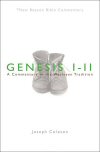
Genesis 1–11 is clear and accessible without sacrificing serious scholarship. In the Logos edition, each Scripture passage links to your favorite translation, and is easy to study side by side with your other Genesis commentaries. You can search by topic or Scripture with remarkably fast results.
Joseph Coleson is professor of Old Testament at Nazarene Theological Seminary. He received his BA from Indiana Wesleyan University and his MA and PhD from Brandeis University. He has served as co-editor of Kardia, the journal of Western Evangelical Seminary, and is a member of the translation team of the New Living Translation and of the Eighth Oxford Institute of Methodist Theological Studies.
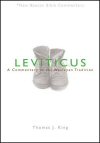
Traditionally ascribed to Moses, Leviticus received its English title from the Greek Levitikon, which means “pertaining to Levites.” It is a book about holiness that develops a theology about how humanity relates to God.
Thomas J. King is professor of Old Testament at Nazarene Bible College. He previously served as a Bible lecturer at St. Mary’s College of California. He is an ordained elder in the Church of the Nazarene. King earned a BA from Northwest Christian College, an MDiv from Brite Divinity School, and a PhD from the Graduate Theological Union. He is the author of The Realignment of the Priestly Literature in the Prince Theological Monograph Series.
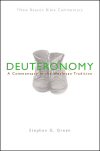
Deuteronomy, whose name is derived from the Greek word for “second law,” is one of the most influential books of the Bible. As a narration of the “second” giving of the law by Moses before Israel enters the Promised Land, Deuteronomy provides the theological vision for Joshua, Judges, 1 & 2 Kings and canonically is the hinge that joins the Torah to these six books of Deuteronomistic History.
Stephen Green calls attention to Deuteronomy’s importance, adeptly handling such key passages as the Decalogue, the Shema, and the song of Moses. He highlights the importance of Deuteronomy for the Christian faith, observing Jesus’ dependence on it for teaching on faith, love, obedience, and so on. Expertly crafted, this commentary is an essential resource for anyone wanting a deeper understanding of the Old and New Testaments and the foundational ideas of Christianity.
Stephen Green holds the W. N. King Chair of Theological and Biblical Studies at Southern Nazarene University. He is a graduate of Southern Nazarene University, Nazarene Theological Seminary, and Vanderbilt University, where he received a doctoral degree in Old Testament. He has also done postdoctoral work in theology and philosophy at Fuller Theological Seminary.
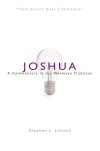
For centuries a book of high significance, Joshua has in recent times experienced some doubts about its historicity. But as Stephen Lennox clearly shows, Joshua is reliable historically when seen through the proper ancient lenses. Unlike modern historians, who seek to relay detailed accounts of events with exact times and places, ancient historians sought to persuade others through their narration of the past. This is the case with Joshua. Here is a book whose main purpose is to convince its readers that God is a God who keeps his promises. Within its pages God is depicted as the hero, the one who fulfills his word to give his people the land of Canaan.
With scholarly precision, Dr. Lennox’s commentary not only brings to light the true nature and purpose of Joshua but also presents an accurate and inspiring portrait of its timeless message. Here again is a valuable and essential tool for the study of Scripture. This is a commentary that belongs on every Bible student’s bookshelf.
Stephen Lennox is Honors Professor of Bible and Humanities at Indiana Wesleyan University, where he has taught Scripture and theology for over twenty years. He holds a B.A. from Houghton College, an M.Div. from Evangelical Theological Seminary, and a Ph.D. from Drew University. He has written commentaries on Psalms and Proverbs, as well as God with Us, an introduction to the Old Testament.
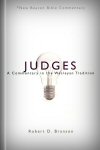
The book of Judges both fires the imagination and chills the soul. Great victories over the strong were won by the weak. Oppressed and enslaved, the tribes of Israel struggled against the opposing forces equipped with the most advanced technology. The four soldiers of Barak fought the battalions of chariots commanded by Sisera. The Philistines who knew the secret of smelting iron equipped their armies with modern weapons while the Israelites had few weapons to fight with. Yet the God of Israel fought for his people. Led by a charismatic leader chosen by God, the victorious armies wrested their freedom from the hands of their oppressors.
Robert D. Branson’s commentary moves verse-by-verse through the book of Judges and provides illuminating insight into a book that records not only the triumphs of war but also the depths of human depravity.
Robert Branson, former professor of biblical literature at Olivet Nazarene University, also taught at Warner Southern College and Eastern Nazarene College.
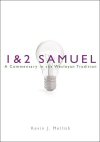
The books of Samuel constitute an important part of the larger literacy work that extends from Joshua through Kings, which modern scholars refer to as the Deuteronomistic History. These books provide a vital literary and historical link in the Bible’s overall presentation of Israel’s past.
Kevin Mellish has taught biblical literature at Olivet Nazarene University since 2004. He received his BA from Olivet Nazarene University, MDiv from Nazarene Theological Seminary, and MPhil and DPhil from Claremont Graduate University. Previously, he served in the Ontario-Montclair School District and as an associate pastor at Ontario First Church of the Nazarene.
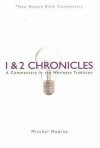
Reaching from the first human to the end of the Babylonian exile, the books of Chronicles reveal a God who is engaged in human history. They demonstrate God promise keeping nature, his special relationship with his people, and how humanity relates to God. Mitchell Modine provides an excellent Wesleyan commentary. His introduction discusses Chronicles’ place in the Old Testament, authorship, and the theological nature of the text.
Mitchel Modine is an ordained elder in the Church of the Nazarene. He has taught Old Testament at Asia-Pacific Nazarene Theological Seminary since 2008. He is the author of several scholarly and popular articles, along with three books, including Jeremiah 26-52, also in the New Beacon Bible Commentary series.
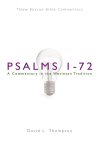
Perhaps no other book of the Old Testament is more beloved, more widely used, and more often interpreted than Psalms. Psalms 1–72 is the first of two volumes on this treasured collection of hymns, praises, and prayers.
With scholarly precision, David Thompson brings to the forefront the meaning of each psalm, describing its background and original function in the life of God’s people. He then skillfully steers the reader toward present-day applications, displaying a keen grasp of what the psalms mean in the light of Christ’s coming. Through this commentary, pastors, worship leaders, teachers, and laypeople can gain increased insight into how each psalm best fits in worship, ministry, and daily life. Biblically sound and thoroughly relevant, this commentary is an essential guide to the church’s most important book of prayer and song.
David Thompson serves at Asbury Seminary as the F.M. and Ada Thompson Professor of Biblical Studies. After doctoral studies and professorial assignments at United Wesleyan College and Marion College (now Indiana Wesleyan University), this prolific author has also served in a pastoral assignment in Rockville, MD.
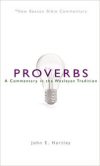
The book of Proverbs is a challenging read, and studying it can lead to frustration. John Hartley has provided excellent guidance to help readers mine the riches of this valuable biblical book. Helpful overviews containing important topics and themes introduce major sections. Headings assist in identifying the topics of individual sayings. These features combined with the scholarly expertise that the author brings to the text make this commentary an essential resource for any library. Through this expert guidance, each proverb can fulfill its intention of being a word of wisdom for contemplation and reflection.
John E. Hartley is Distinguished Professor of Old Testament at Azusa Pacific Seminary in Azusa, California. He holds a B.A. from Greenville College, a B.D. from Asbury Theological Seminary, and an M.A. and a Ph.D. in Mediterranean studies from Brandies University in Waltham, Massachusetts. He is the author of The Book of Job for the New International Commentary on the Old Testament series (Eerdmans), Leviticus for the Word Biblical Commentary series (Zondervan), and Genesis for the Understanding the Bible Commentary Series (Baker).
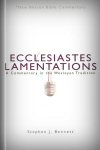
Ecclesiastes is one of the most interesting books in the Bible, in part because it is so different from the others, even from the other wisdom books (Job, Proverbs, Song of Songs). Like the wisdom books, Ecclesiastes largely ignores the history and law of ancient Israel, but it also challenges the accepted themes and theology of the wisdom tradition. This has led to puzzlement from general readers and a great diversity of interpretation from scholars. The purpose of this commentary by Stephen J. Bennet is to provide a viable and helpful interpretation of Ecclesiastes while also surveying some diverse interpretations previously made by noted scholars.
The book of Lamentations is a collection of five psalms that lament the fall of Jerusalem. They are largely an expression of grief and contain very little information about the historical events that caused the suffering. Instead they provide details of desolation and shame, expressions of emotion, accusations against God, and sometimes hints of repentance and glimmers of hope.
Stephen J. Bennett is the associate professor of Old Testament at Nyack College, New York. This ordained elder in the Church of the Nazarene has a PhD from Manchester University.
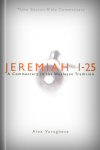
The book of Jeremiah occupies a prominent place in the Old Testament canon at least on three counts: (1) its massive size (the second longest book in the Bible and the longest prophetic book); (2) the complexity of its content and message; and (3) the towering prophetic figure behind the book that stands shoulder to shoulder with other great prophets such as Isaiah and Ezekiel.
Alex Varughese’s verse-by-verse commentary observes the theological expressions of God’s sovereignty over Judah and the nations in the world found in Jeremiah 1–25.
Alex Varughese is professor of biblical literature at Mount Vernon Nazarene University and has been a member of the Department of Religion at MVNU since 1982. Previous to his current position, he served as a professor in the religion department at Eastern Nazarene College. He is an ordained elder in the Church of the Nazarene and holds BS and MS degrees from the University of Kerala, India. He received his MA in religion from Olivet Nazarene University and MDiv from Nazarene Theological Seminary. He also holds MPhil and PhD degrees in biblical studies from Drew University. He is currently serving as the Managing Editor for The Centennial Initiative Textbook project for the Church of the Nazarene.
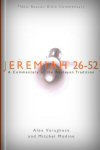
The book of Jeremiah occupies a prominent place in the Old Testament canon at least on three counts: (1) its massive size (the second longest book in the Bible and the longest prophetic book); (2) the complexity of its content and message; and (3) the towering prophetic figure behind the book that stands shoulder to shoulder with other great prophets such as Isaiah and Ezekiel.
Alex Varughese’s and Mitchel Modine’s verse-by-verse commentary observes the theological expressions of God’s sovereignty over Judah and the nations in the world found in Jeremiah 26–52.
Alex Varughese is professor of biblical literature at Mount Vernon Nazarene University and has been a member of the Department of Religion at MVNU since 1982. Previous to his current position, he served as a professor in the religion department at Eastern Nazarene College. He is an ordained elder in the Church of the Nazarene and holds BS and MS degrees from the University of Kerala, India. He received his MA in religion from Olivet Nazarene University and MDiv from Nazarene Theological Seminary. He also holds MPhil and PhD degrees in biblical studies from Drew University. He is currently serving as the Managing Editor for The Centennial Initiative Textbook project for the Church of the Nazarene.
Mitchel Modine is an assistant professor of Old Testament and the director of the Master of Science in Theology program at Asia-Pacific Nazarene Theological Seminary. He is the author of several scholarly papers, and is currently finalizing his dissertation, Everything Written in This Book: The Perceptions of the Exile in the Book of Jeremiah, for publication.
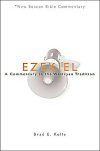
Ezekiel is clear and accessible without sacrificing serious scholarship. The aim of this volume is to offer a distinctive engagement with the theological dynamics of the book for readers from the Wesleyan theological tradition, with a special eye to Ezekiel’s use of Old Testament priestly theology to respond to the trauma associated with the Babylonian exile.
Brad E. Kelle is the assistant professor of biblical literature, Point Loma Nazarene University. An ordained elder in the Church of the Nazarene, he holds degrees from Emory University, Chandler School of Theology, and Trevecca Nazarene University. He is also the author of numerous articles.
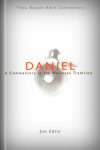
The book of Daniel speaks a fresh message to each new generation. For over two millennia it has done so. The book invites its readers to live within a larger story than their own. It gives them a glimpse of the broad sweep of human history and the cosmic proportions of God’s intentions. In light of certainties about the final outcome of this world, this book challenges believers to risk radical faith in God within the context of a hostile world.
This message has been especially relevant to those individuals and communities who have become disillusioned by present realities. Where political and social systems disappoint, Daniel provides hope. In contexts of oppressive, even anti-God, governments, Daniel infuses courage. When the strong undertow of secular values confuses, Daniel calls for clear choices. As the siren song of cultural compromise lures, Daniel gives reason for restraint. Century after century, the pages of Daniel have infused the faithful with fortitude.
Jim Edlin is professor of biblical literature and languages and the dean of the school of religion and philosophy at MidAmerica Nazarene University. He earned an MDiv from Nazarene Theological Seminary and a ThM and PhD in Old Testament studies from Southern Baptist Theological Seminary. He is also the author of Discovering the Old Testament. He is a frequent contributor to Adult Faith Connection and Illustrated Bible Life.
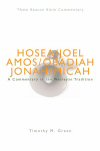
Timothy M. Green’s Wesleyan commentary covers the first six minor prophets—Hosea, Joel, Amos, Obadiah, Jonah, and Micah. Green provides an introduction to each book that discusses its significance in the rest of the Bible, its historical context, theological themes, and literary analysis.
Timothy M. Green is dean of the Millard Reed School of Theology and Christian Ministry and the university chaplain at Trevecca Nazarene University in Nashville, where he also serves as professor of Old Testament literature and theology. He received his PhD in Hebrew Bible from Vanderbilt University.
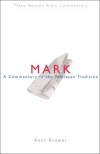
Kent Brower offers insight into the intricacies of Mark. With verse-by-verse commentary, Brower considers the literary features, theological themes, and hermeneutical issues present in the text.
Kent Brower has taught and guest lectured at colleges, universities, and seminaries around the world for more than 30 years. He has earned degrees from Canadian Nazarene College, Eastern Nazarene College, and the University of Manchester—under the supervision of Professor F. F. Bruce. Brower currently serves as vice principal and senior lecturer in biblical studies at Nazarene Theological College in Manchester, England.
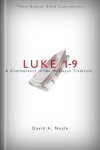
Many stories from the Gospel of Luke have entered our shared imagination. Only Luke tells us about Zechariah and Elizabeth and the birth of John the Baptist. Likewise, it is Luke who tells us about Mary’s visit from Gabriel and the joyous encounter some months later with Elizabeth. Luke writes of Mary’s song of joy, the shepherds at the manger, and the adoration of Anna and Simeon in the temple.
Other well-known stories are found only in Luke: the boy Jesus in the temple, the good samaritan, the prodigal son, the pharisee and the tax collector praying in the temple, and the diminutive Zacchaeus high up in a tree. In his post-resurrection narrative, Luke alone portrays the disciples walking along the road to Emmaus after the resurrection, heads bent in conversation with the risen Jesus. And alone among the evangelists, Luke describes the ascension of Jesus in detail in chapter 24 of the Gospel, and then further in Acts 1.
David A. Neale is vice president and academic dean of Booth University College in Winnipeg and professor emeritus at Ambrose University College (formerly Canadian Nazarene University College) in Calgary. He holds a BA in sociology from Idaho State University, and MA in theology from Fuller Theological Seminary, and a PhD from the University of Sheffield, England.
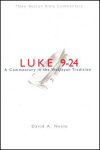
The Gospel of Luke features many well-known narratives that are not found in the other Gospel accounts. Among them are the prodigal son, the good Samaritan, and the story of Zachaeus. David Neale calls Luke’s Gospel “the gospel of second chances,” as Luke emphasizes Christ’s offer of new life, regardless of past sin.
David Neale is vice-president and academic dean at Booth University College in Winnipeg, Manitoba. Previously, he served as vice president of academic affairs at Ambrose University College in Calgary, Alberta. He holds a BA in sociology from Idaho State University, and MA in biblical studies from Fuller Theological Seminary, and a PhD from the University of Sheffield, England.
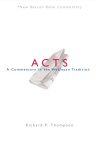
The book of Acts portrays the earliest followers of the risen and ascended Christ. Throughout its pages, from Pentecost onward, God is continually present in the lives of believers, empowering them as they declare through word and deed what God has done for the people of Israel—and ultimately for the rest of the world—through Christ.
Richard Thompson skillfully delves into these ideas and teases out their implications for today. Maintaining on sound evidence that Acts follows the Gospel of Luke as a second volume, Thompson brings the Third Gospel into his examination of Acts, showing how the Lukan portrayal of Jesus is mirrored in the lives of the early believers. These features and many others give this commentary on Acts a richness that commends it to pastors, teachers, students, and laypeople as a valuable resource for study and instruction.
Richard P. Thompson is the Professor of New Testament at Northwest Nazarene University where he has served as the Chair of the religion department. He has authored numerous publications and articles and holds a Ph.D. Southern Methodist University and an M.Div. Nazarene Theological Seminary.
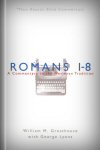
In November 1515, Martin Luther, Augustinian monk and doctor of sacred theology at the University of Wittenberg, began his expositions of Romans. As he prepared his lectures he came to see more clearly the meaning of Paul’s gospel of justification by faith. The phrase the “righteousness of God” he had once hated as demanding what he could not deliver. Now in his study he came to see righteousness as a gift of God by which a person came to live, by faith. And he felt himself reborn. The consequence of this new insight the world knows. The Protestant Reformation had been born.
Throughout the centuries this Epistle has in a peculiar way been able to furnish an impulse for spiritual renewal. When the church had drifted away from the gospel, a deep study of Romans has repeatedly been the means by which the loss has been recovered.
William Greathouse is general superintendent emeritus at the Church of the Nazarene. He has also served as president, dean of religion, and professor at Trevecca Nazarene College. He also served faithfully as the president of Nazarene Theological Seminary. He has authored numerous books and served as a pastor on the Tennessee District. He holds degrees from Lambuth College, Trevecca Nazarene College, and Vanderbilt University.
George Lyons has been professor of New Testament at Northwest Nazarene since 1991, after teaching 14 years at Olivet Nazarene University. He has also served as a visiting professor at Nazarene Theological Seminary, Point Loma Nazarene University, Mount Vernon Nazarene University, Nazarene Theological College, Southeast Asia Nazarene Bible College, and European Nazarene College. He has also taught in China. He is a past president of the Wesleyan Theological Society and a member of the Society of Biblical Literature. He holds degrees from Olivet Nazarene University and Nazarene Theological Seminary as well as a PhD from Emory University.
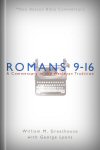
In November 1515, Martin Luther, Augustinian monk and doctor of sacred theology at the University of Wittenberg, began his expositions of Romans. As he prepared his lectures he came to see more clearly the meaning of Paul’s gospel of justification by faith. The phrase the “righteousness of God” he had once hated as demanding what he could not deliver. Now in his study he came to see righteousness as a gift of God by which a person came to live, by faith. And he felt himself reborn. The consequence of this new insight the world knows. The Protestant Reformation had been born.
Throughout the centuries this Epistle has in a peculiar way been able to furnish an impulse for spiritual renewal. When the church had drifted away from the gospel, a deep study of Romans has repeatedly been the means by which the loss has been recovered.
William Greathouse is general superintendent emeritus at the Church of the Nazarene. He has also served as president, dean of religion, and professor at Trevecca Nazarene College. He also served faithfully as the president of Nazarene Theological Seminary. He has authored numerous books and served as a pastor on the Tennessee District. He holds degrees from Lambuth College, Trevecca Nazarene College, and Vanderbilt University.
George Lyons has been professor of New Testament at Northwest Nazarene since 1991, after teaching 14 years at Olivet Nazarene University. He has also served as a visiting professor at Nazarene Theological Seminary, Point Loma Nazarene University, Mount Vernon Nazarene University, Nazarene Theological College, Southeast Asia Nazarene Bible College, and European Nazarene College. He has also taught in China. He is a past president of the Wesleyan Theological Society and a member of the Society of Biblical Literature. He holds degrees from Olivet Nazarene University and Nazarene Theological Seminary as well as a PhD from Emory University.
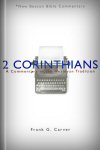
As Philippians amazes us with its unveiling of the quality of Paul’s commitment as a Christian, 2 Corinthians astounds us by its revelation of the radical caliber of his commitment as a servant and apostle of Christ. Open to view in this letter is the heartthrob of that gospel ministry that belongs to every member of Christ, clergy and laity alike—its life commitment, its divine resources, and its cross/resurrection character. Witness is borne to the inescapable truth that the mission of the church as the body of Christ is to carry on the self-giving, sacrificial, and suffering ministry of Jesus.
To the contemporary church this letter raises questions about the shape of its message and the nature and style of its ministry. The theological dimension of the letter is of crucial significance for the self-understanding of the church in today’s world.
Frank G. Carver is professor emeritus of religion, Point Loma Nazarene University. Carver is retired as professor of biblical theology and Greek. He holds degrees from Taylor University, Nazarene Theological Seminary, Princeton Theological Seminary, and a PhD from New College, University of Edinburgh, Scotland, with postgraduate work at Claremont Graduate School. He has pastored churches in both the United States and in Scotland.
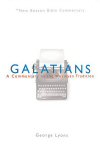
This letter claims the apostle Paul wrote it. No serious contemporary scholar questions that claim. In fact, most appeal to Galatians to assess the authenticity of the other Pauline letters. It remains uncertain what influence Paul’s anonymous co-senders may also have had on the letter’s composition.
George Lyons has been professor of New Testament at Northwest Nazarene since 1991, after teaching 14 years at Olivet Nazarene University. He has also served as a visiting professor at Nazarene Theological Seminary, Point Loma Nazarene University, Mount Vernon Nazarene University, Nazarene Theological College, Southeast Asia Nazarene Bible College, and European Nazarene College. He has also taught in China. He is a past president of the Wesleyan Theological Society and a member of the Society of Biblical Literature. He holds degrees from Olivet Nazarene University and Nazarene Theological Seminary as well as a PhD from Emory University.
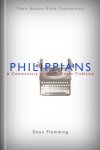
One of the shortest of Paul’s letters, Philippians is perhaps the most beloved by the church. No doubt, this is due in part to its high concentration of memorable passages that constantly challenge and encourage the people of God. What is more, the letter glows with affection and joy. The imprisoned Paul who writes Philippians is not hard to love. But we should not allow the letter’s warm and pastoral tone to mask its theological importance. Philippians is practical, but it is hardly “lightweight.” It holds some deeply theological reflections, particularly about Christ and the cruciform character of life in Christ.
Philippians is arguably Paul’s most personal letter. It gives us an intimate glimpse into the self-understanding of this incarcerated apostle to the gentiles. Paul airs his inmost thoughts, tells his personal story, and testifies to his burning passion to know Christ his Lord and to make Him known. He also reveals his deep love and affection for this church, which has faithfully partnered with him in ministry from its earliest days.
But this letter is not about Paul. Above all, Philippians is concerned with the advance of the gospel and the formation of a local Christian community—a congregation that faces pressures from both inside and outside the church. Paul’s theological response to his own situation and that of his audience yields a Christ-centered letter that continues to shape Christian communities today.
Dean Flemming has written what should become "the commentary of first reference" on the Apostle Paul’s letter to the Philippians. He is thoroughly conversant with all of the serious scholarship on Philippians to date. But he makes scholarship easily accessible to average readers and points them to further reading on subjects he must treat in summary fashion. I highly recommend this commentary.
—George Lyons, professor of New Testament, Northwest Nazarene University
Dean Flemming (PhD, University of Aberdeen) is a lecturer in New Testament at European Nazarene College in Buesingen, Germany. His other publications include Contextualization in the New Testament: Patterns for Theology and Mission.
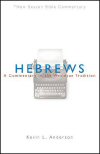
The book of Hebrews is often regarded as the most rhetorically accomplished work in the New Testament. Its authorship has been debated since the earliest days of the church, and is considered unknowable my most modern scholars. Written to both Jews and Gentiles, Hebrews calls on Christians to persevere in Christ and expounds on Christ’s role as mediator between God and man.
Kevin L. Anderson is assistant professor of New Testament at Asbury College. He holds a PhD from London School of Theology and an MDiv from Nazarene Theological Seminary.
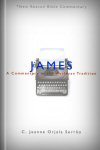
The book of James is full of advice on how Christians should live. Thus, some say it contradicts Paul’s gospel of grace and faith, and they question its place in the canon. However, this commentary will show that James’ and Paul’s thoughts are complementary, not contradictory.
C. Jeanne Orjala Serrão is professor of biblical literature and dean of the school of theology and philosophy at Mount Vernon Nazarene University in Mount Vernon, Ohio where she founded and is the coordinator for the Bi-Annual Women In Ministry Networking Day. Serrão has served as an education pastor and Christian school administrator in Rancho Cucamonga, California. She has taught at European Nazarene College and has served as an adjunct professor for Trevecca Nazarene University, Asuza Pacific University, Claremont School of Theology (summer licensing school), and Nazarene Bible College online program. She earned her BA in biblical literature from Mid-America Nazarene University, and a MDiv and a MA in missions from Nazarene Theological Seminary and her PhD degree from Claremont Graduate University. She is an ordained elder in the Church of the Nazarene.
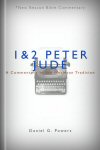
Peter is without question the most prominent of the disciples of Jesus. Based on Peter’s prominent role, one would expect any letters associated with Peter to play an equally significant role among the New Testament canonical writings. But this has not been the case.
This inattention is unfortunate, because 1 Peter contains significant theology and pastoral care. Wherever the church has undergone suffering, 1 Peter has proven to be extremely relevant. Suffering is not usually a popular or attractive theme. But if Jesus and Paul are correct, the church will suffer. Whenever that occurs, 1 Peter stands as a source of comfort and guidance.
2 Peter offers a message today’s believers should not be so quick to ignore. Believers can learn from the ancient message of 2 Peter to be on guard against postmodern forms of ethical relativism and theological pluralism. This letter reminds Christians that the only solid foundation for truth is found in the Scriptures and the apostolic tradition.
Jude is one of the shortest letters in the Bible. Sandwiched between the letters of John and Revelation, Jude is arguably the least well-known writing of the Christian Scriptures. Nonetheless, the message of Jude is a relevant and needed warning against false teaching and pseudo-Christianity. Jude sounds the alarm against a form of Christianity that tries to separate Christian belief from Christian behavior. The chords of Jude’s message seem out of tune in the cacophony of today’s popular clamor for tolerance and moral relativity. But its message is as necessary as ever.
Daniel G. Powers is professor of Bible at Nazarene Bible College. He has also served as Bible lecturer at European Nazarene College. This ordained elder in the Church of the Nazarene also holds degrees from Point Loma College, Nazarene Theological Seminary as well as a PhD from Leiden University.
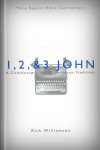
First John presents lofty claims: “I write this to you so that you will not sin” (2:1); “No one who is born of God will continue to sin” (3:9); and “Anyone born of God does not continue to sin” (5:18). These must be understood in their original context, without dismissing their enduring spiritual implications. This commentary attempts to balance the scriptural call to holy living with the pastoral call to treat redemptively those who fail.
The letters of 2 John and 3 John offer a significant window into the life of first-century churches. Readers encounter issues of ecclesiology (church leadership, gender issues, and how the churches were interconnected) and social/cultural realities. Here we see especially how hospitality in the early churches was related to itinerant evangelism.
Rick Williamson is professor of biblical literature at Mount Vernon Nazarene University. He has also served as chaplain for adult and graduate studies, was the professor of Bible for the Nazarene Bible college, served as a hospital chaplain, a military chaplain, and pastored in Iowa and Indiana. He holds degrees from Southern Baptist Seminary, University of Iowa, Nazarene Theological Seminary, and MidAmerica Nazarene University.
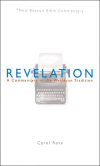
Throughout its history, Revelation has suffered misinterpretations from allegory to literal manipulations, including the development of spectacular end-time scenarios. These caricatures of Revelation fail to grasp its foundational theology, reassuring promises, hopeful evangelism, and especially its pastoral nature. Carol Rotz moves meticulously through this rich descriptive letter, focusing on the truth of the biblical text.
Carol Rotz received her BA degree in religious education from Northwest Nazarene University, BTheol from Canadian University College, MA from Olivet Nazarene University and the University of Port Elizabeth, and a DPhil from Rand Afrikaans University. Rotz retired as a member of the faculty of the School of Theology and Christian Ministries at Northwest Nazarene University where she was the chair of the religion department. She teaches graduate and undergraduate Bible and theology. Rotz served internationally in mission education for 20 years.
Reviews
0 ratings

Claude Brown Jr
4/20/2020
And, why is this not in a Logos base package, ignoring the upgrade as that is another conversation.